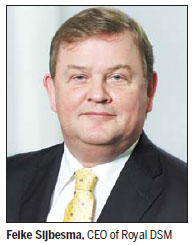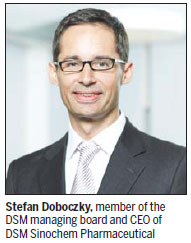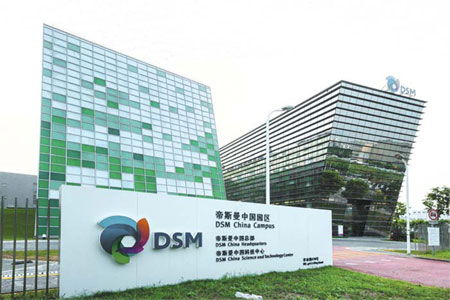Industry Special: Royal DSM: Expertise in sustainability
Updated: 2014-03-23 08:17
By Zhang Zhao(China Daily)
|
|||||||||
As China shifts its growth model to become more sustainable, Royal DSM from the Netherlands is finding new opportunities due to its strong expertise in cleaner, more efficient production.
"China will continue to grow economically and this will result in further urbanization, which means there could be further pressure on the environment," the company's CEO Feike Sijbesma told China Daily.
But he is "convinced that China will address these environmental issues and develop new, emerging energy sources".
He said such an industrial restructuring happened at DSM, which started as a coal mining company in 1902 but is now a global specialist in health, nutrition and materials sciences.
Sijbesma said the company is "very much willing to contribute" to China by providing clean technology to its customers "so that they can for instance make paint healthier and cars lighter".
In 2010, DSM and its Chinese partner Beijing Yulin Chemical jointly developed a water-based bus coating later termed "the world's pioneering and China's leading product" by an expert assessment panel.

Yearlong experiments on buses in different regions across the nation proved that the product is stable, has wide application possibilities, good adhesion, strong resistance to rust and a high-gloss paint surface.
Compared with traditional solvent-based products, water-based coating helps reduce pollution by eliminating solvent emissions, which is also beneficial to the health of spray operators and bus passengers.
DSM will also play an active role in the development of alternative energy sources by introducing more efficient solar technologies and second-generation biofuels made from waste, said Sijbesma.
For China such breakthroughs "will be one of the keys to addressing the sustainability issues resulting from growth", he added.
"China is focusing on the long term, rather than a quick win," he said. "We see a switch in the type of growth - away from exports and investment-driven growth - to that driven by domestic consumer demand.
"DSM remains very committed to China and sees a lot of potential as this kind of growth is here to stay."
Presence in 1963
The company began trading with China in 1963, then established its first sales office and manufacturing facility in the early 1990s. It currently has 42 affiliates nationwide including 25 manufacturing sites.
Last year its operations in the country generated $1.7 billion in total sales revenue.
DSM Nanjing Chemical Co, jointly owned by DSM and two local companies, announced in 2011 that it started an expansion initiative to double its annual caprolactam production capacity to 400,000 tons, the most in the world.
Caprolactam is a chemical material used in making nylon.

Built at a cost of about $300 million, the plant uses new technologies to reduce energy consumption by 30 percent while increasing productivity.
DSM has also made strong efforts in R&D and innovation with its Chinese partners. The DSM China Campus in Shanghai is the company's biggest and most important research facility outside Europe and the United States.
The facilities "allow us to protect and build both our portfolio and our legacy of being a leader in innovation", said Stefan Doboczky, DSM managing board member responsible for the company's Asia operations.
Also the CEO at the joint venture DSM Sinochem Pharmaceutical, Doboczky said the partnership is a successful example of two leading companies joining together in their strong commitment to sustainable growth.
He said DSM and Sinochem will continue to invest in innovation and training of professionals to meet local needs better.
DSM's products are also used in offshore aquaculture.
In recent years, rapid expansion of ports and industrial facilities along China's coast has increasingly threatened the offshore aquaculture environment.
So farmers are gradually extending seafood breeding into deeper seas far away from the coast, leading to increased demand for large, strong and durable deep-sea cage nets that can withstand harsh conditions.
In response Shandong ICD High Performance Fiber Co, majority-owned by DSM, developed a super-large aquaculture cage net made from an ultra-strong fiber instead of traditional polyethylene or nylon.
Developers said it is an ideal material for a deep-sea cage net because it is both lightweight and resistant to high wear and tear.
zhangzhao@chinadaily.com.cn
|
The DSM China Campus in Shanghai is the company's biggest research facility outside Europe and the US. Photos Provided to China Daily |
(China Daily 03/23/2014 page3)
